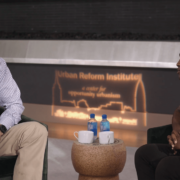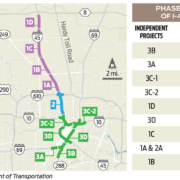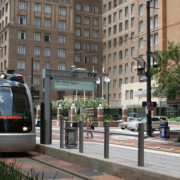Simple Free Solution to TX Winter Storm Blackouts
Our lead item this week is confirmation that a simple bureaucratic fix could have prevented the massive Texas winter storm blackouts and easily prevent them in the future: simply add natural gas pipeline electric pumps to the list of critical infrastructure like hospitals so they don’t get their power cut. If the gas had kept pumping through those pipelines, the gas-fired electric generation plants would have stayed online:
“Grant Ruckel, vice president of government affairs at pipeline company Energy Transfer, testified that the biggest failure during the disaster was cutting power to gas pipelines, many of which are not listed as essential services, a designation made for hospitals and other critical infrastructure.” …
“Deshotel said he had asked generators how many plants would have gone down if they hadn’t lost gas pressure, and the answer was only a couple.”
Moving on to this week’s items:
- Our Urban Reform Institute released the 2021 Edition of the Demographia International Housing Affordability last week. Houston scored a reasonable median multiple of home prices to salaries of 4, categorized as “moderately unaffordable”, although I’m not sure that’s the case with mortgage rates this low. Only 4 cities out of 92 made it to affordable with ratios 3 and under: Pittsburgh, Rochester, Buffalo, and St. Louis. Austin and Dallas tied as the most expensive in Texas at 4.3, which may surprise some people given Austin’s crazy housing market. Austin’s score gets lowered by factoring in less expensive housing in the metro area (including Round Rock) as well as the higher average (tech) salaries in Austin.
- Techxodus: 7 Cities Slated To Become The Next Silicon Valley Happily surprised to see Houston on this list!
- Forbes: Florida Is Fast Becoming The Second Home For Wall Street
‘We surveyed our employees, and the No. 1 concern that people had was quality of life—but also taking mass transit to New York City any time in the foreseeable future.” There’s another benefit for the well-paid workers too. They will “see a lateral pay move, which amounts to around an 11% increase in salary because Florida has zero income tax.”’
- NYT: The Future of Texas. I like this opening excerpt, but the rest of the story is a bit silly, pretending that if Texas didn’t produce fossil fuels climate change would be magically solved instead of just importing more oil from the Middle East.
“You can make a case that the U.S. state with the brightest long-term economic future is Texas. It’s a more affordable place to live than much of the Northeast or West Coast and still has powerful ways to draw new residents, including a thriving cultural scene, a diverse population and top research universities. Its elementary schools and middle schools perform well above average in reading and math (and notably ahead of California’s), according to the Urban Institute.
These strengths have helped the population of Texas to surge by more than 15 percent, or about four million people, over the past decade. In the past few months, two high-profile technology companies — Oracle and Hewlett-Packard Enterprise — have announced they are moving their headquarters to the state, and Tesla may soon follow. As California was in the 20th century, Texas today looks like a state that can embody and shape the country’s future.“
- NYT: Texans Needed Food and Comfort After a Brutal Storm. As Usual, They Found It at H-E-B. – As state government flounders, has a beloved grocery store chain become “the moral center of Texas”? Nice profile of a great company that has really mastered disaster logistics.
- WSJ Peggy Noonan: The Old New York Won’t Come Back – ‘The pandemic changed everything,’ we say. But we have yet to absorb fully everything that means. Excerpt:
“Look at the cities. I’m not sure we see the implications of what has happened there. In New York we are witnessing, for the first time in a century and a half, the collapse of the commuter model. …
A lot of cities, not only New York, are going to have to reinvent themselves, digging down and finding newer purposes, their deepest value. They’re going to have to take stock in a new way: New York has the greatest hospitals, universities, the media, parks. What else?</p
And they will be doing this within a hard context. Public spending is skyrocketing due to greater need; the city and state budget deficits are through the roof. New York is Democratic and public sentiment will be for tax increases, big ones. …
The Partnership for New York City reports 300,000 residents of high-income neighborhoods have filed change-of-address forms with the U.S. Postal Service. You know where they are going: to lower-tax and no-income-tax states, those that have a friendlier attitude toward money-making and that presumably aren’t going hard-left.“
Does Houston need to reinvent itself as well? Clearly, we have big needs to invest in resilience infrastructure (Build the Ike Dike! h/t Evan 
This piece first appeared on Houston Strategies.
Tory Gattis is a Founding Senior Fellow with the Center for Opportunity Urbanism and co-authored the original study with noted urbanist Joel Kotkin and others, creating a city philosophy around upward social mobility for all citizens as an alternative to the popular smart growth, new urbanism, and creative class movements. He is also an editor of the Houston Strategies blog.
Photo credit: Brian Bennett via Flickr under CC 2.0 License.

 Brian Bennett, used under CC 2.0 License
Brian Bennett, used under CC 2.0 License






